Analysing Organisational Behaviour: Unilever's Strategies & Impact
VerifiedAdded on 2023/06/18
|16
|5218
|330
Report
AI Summary
This report provides a detailed analysis of organisational behaviour, using Unilever as a case study to examine the influence of culture, politics, and power on individual and team performance. It explores content and process theories of motivation, including Maslow's hierarchy of needs and Vroom's expectancy theory, and discusses motivational techniques employed by Unilever. The report also contrasts effective and ineffective teams, applies organisational behaviour concepts, and assesses the relevance of team development theories. Furthermore, it evaluates the impact of organisational behaviour concepts on behaviour, both positively and negatively, and offers a critical assessment of team development theories within the context of organisational behaviour philosophies. This document is available on Desklib, a platform offering a wide range of study tools and resources for students.
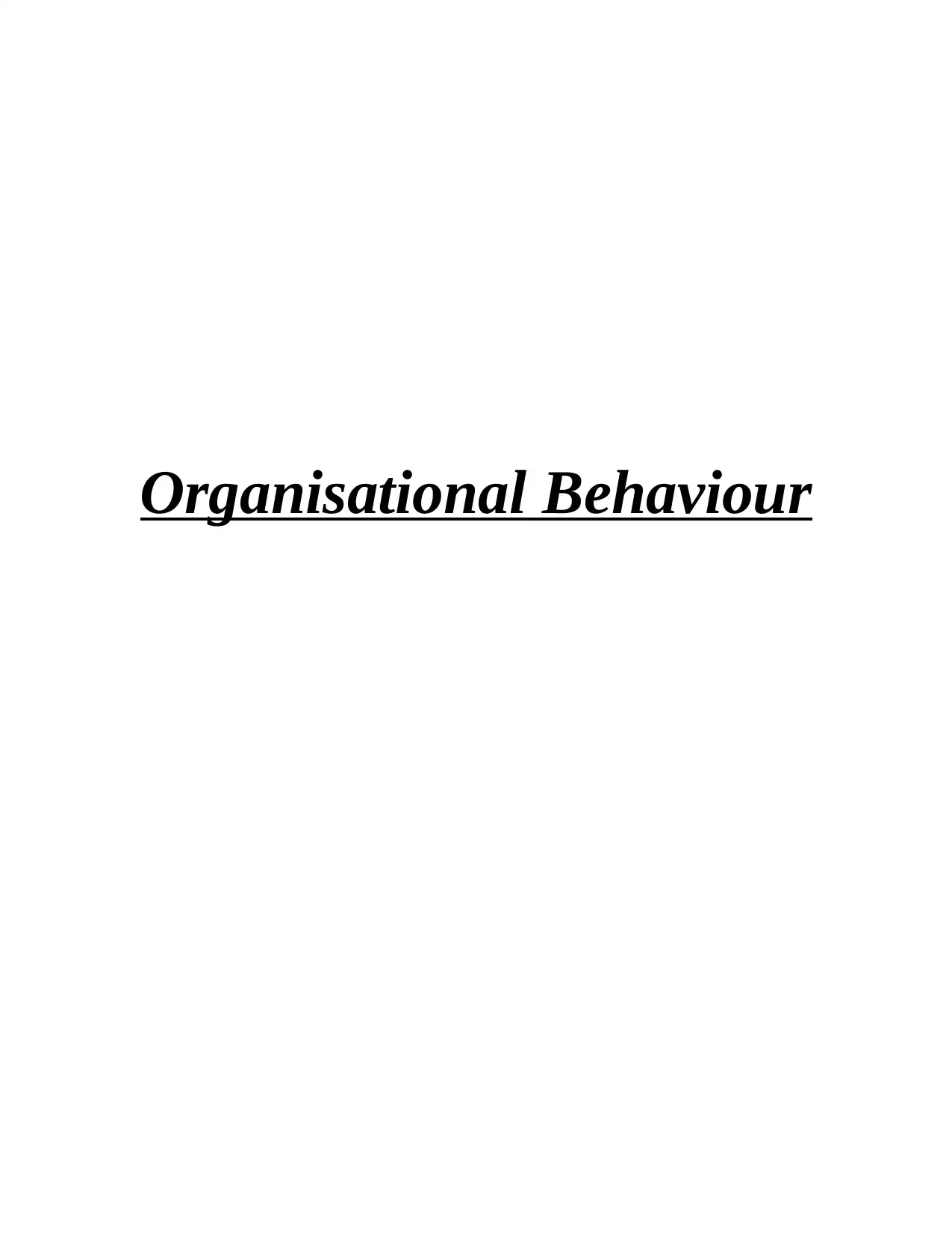
Organisational Behaviour
Paraphrase This Document
Need a fresh take? Get an instant paraphrase of this document with our AI Paraphraser
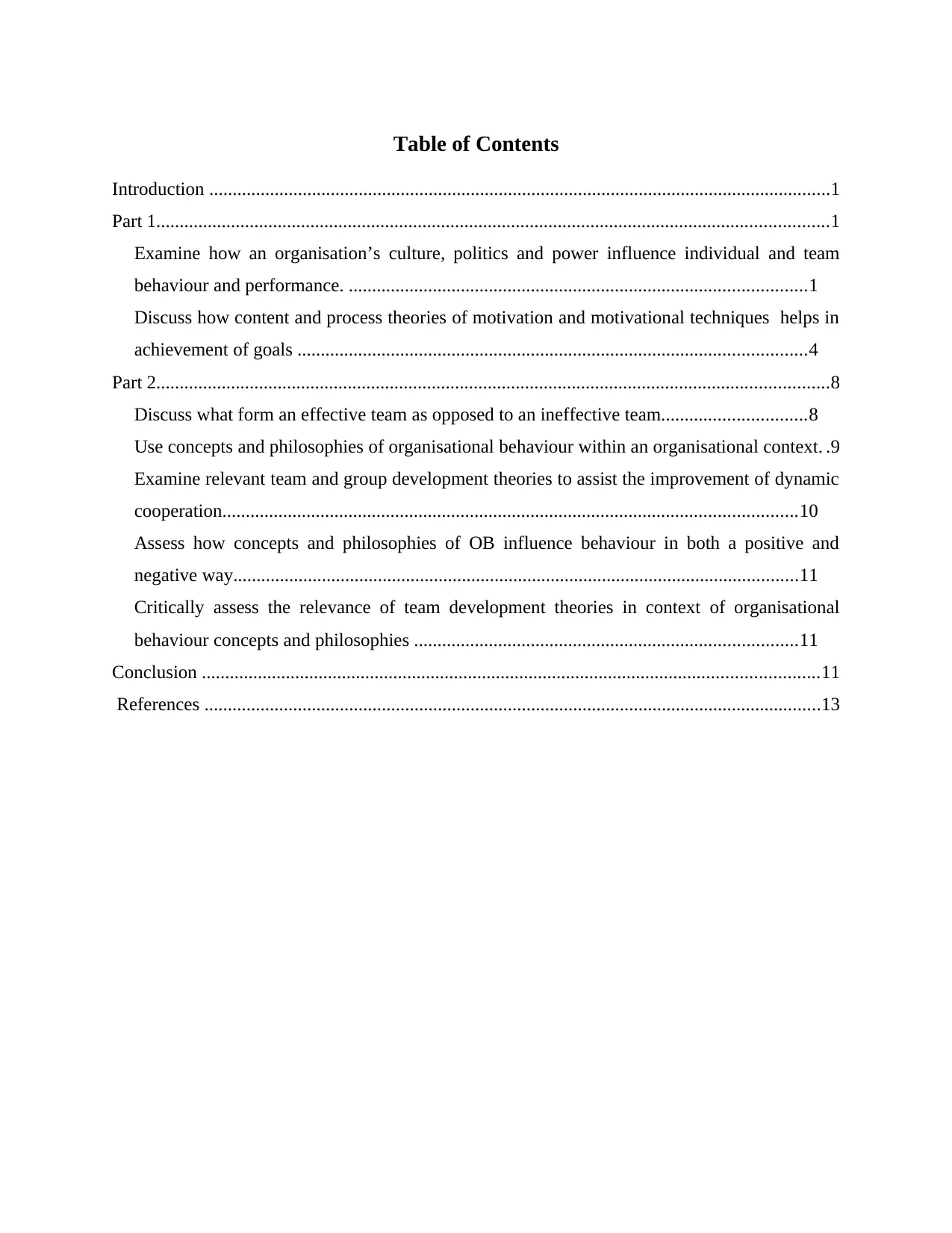
Table of Contents
Introduction .....................................................................................................................................1
Part 1................................................................................................................................................1
Examine how an organisation’s culture, politics and power influence individual and team
behaviour and performance. ..................................................................................................1
Discuss how content and process theories of motivation and motivational techniques helps in
achievement of goals .............................................................................................................4
Part 2................................................................................................................................................8
Discuss what form an effective team as opposed to an ineffective team...............................8
Use concepts and philosophies of organisational behaviour within an organisational context. .9
Examine relevant team and group development theories to assist the improvement of dynamic
cooperation...........................................................................................................................10
Assess how concepts and philosophies of OB influence behaviour in both a positive and
negative way.........................................................................................................................11
Critically assess the relevance of team development theories in context of organisational
behaviour concepts and philosophies ..................................................................................11
Conclusion ....................................................................................................................................11
References ....................................................................................................................................13
Introduction .....................................................................................................................................1
Part 1................................................................................................................................................1
Examine how an organisation’s culture, politics and power influence individual and team
behaviour and performance. ..................................................................................................1
Discuss how content and process theories of motivation and motivational techniques helps in
achievement of goals .............................................................................................................4
Part 2................................................................................................................................................8
Discuss what form an effective team as opposed to an ineffective team...............................8
Use concepts and philosophies of organisational behaviour within an organisational context. .9
Examine relevant team and group development theories to assist the improvement of dynamic
cooperation...........................................................................................................................10
Assess how concepts and philosophies of OB influence behaviour in both a positive and
negative way.........................................................................................................................11
Critically assess the relevance of team development theories in context of organisational
behaviour concepts and philosophies ..................................................................................11
Conclusion ....................................................................................................................................11
References ....................................................................................................................................13
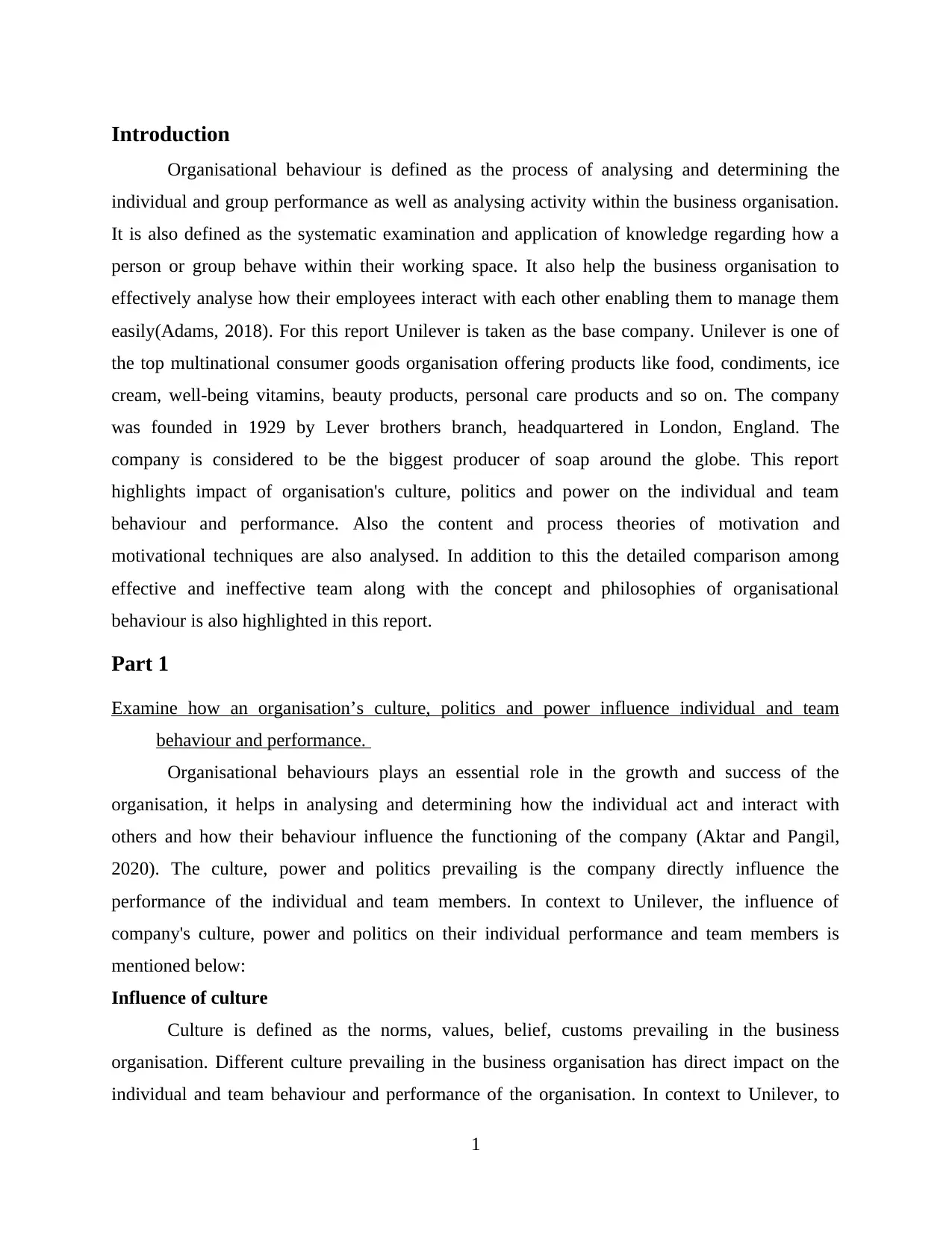
Introduction
Organisational behaviour is defined as the process of analysing and determining the
individual and group performance as well as analysing activity within the business organisation.
It is also defined as the systematic examination and application of knowledge regarding how a
person or group behave within their working space. It also help the business organisation to
effectively analyse how their employees interact with each other enabling them to manage them
easily(Adams, 2018). For this report Unilever is taken as the base company. Unilever is one of
the top multinational consumer goods organisation offering products like food, condiments, ice
cream, well-being vitamins, beauty products, personal care products and so on. The company
was founded in 1929 by Lever brothers branch, headquartered in London, England. The
company is considered to be the biggest producer of soap around the globe. This report
highlights impact of organisation's culture, politics and power on the individual and team
behaviour and performance. Also the content and process theories of motivation and
motivational techniques are also analysed. In addition to this the detailed comparison among
effective and ineffective team along with the concept and philosophies of organisational
behaviour is also highlighted in this report.
Part 1
Examine how an organisation’s culture, politics and power influence individual and team
behaviour and performance.
Organisational behaviours plays an essential role in the growth and success of the
organisation, it helps in analysing and determining how the individual act and interact with
others and how their behaviour influence the functioning of the company (Aktar and Pangil,
2020). The culture, power and politics prevailing is the company directly influence the
performance of the individual and team members. In context to Unilever, the influence of
company's culture, power and politics on their individual performance and team members is
mentioned below:
Influence of culture
Culture is defined as the norms, values, belief, customs prevailing in the business
organisation. Different culture prevailing in the business organisation has direct impact on the
individual and team behaviour and performance of the organisation. In context to Unilever, to
1
Organisational behaviour is defined as the process of analysing and determining the
individual and group performance as well as analysing activity within the business organisation.
It is also defined as the systematic examination and application of knowledge regarding how a
person or group behave within their working space. It also help the business organisation to
effectively analyse how their employees interact with each other enabling them to manage them
easily(Adams, 2018). For this report Unilever is taken as the base company. Unilever is one of
the top multinational consumer goods organisation offering products like food, condiments, ice
cream, well-being vitamins, beauty products, personal care products and so on. The company
was founded in 1929 by Lever brothers branch, headquartered in London, England. The
company is considered to be the biggest producer of soap around the globe. This report
highlights impact of organisation's culture, politics and power on the individual and team
behaviour and performance. Also the content and process theories of motivation and
motivational techniques are also analysed. In addition to this the detailed comparison among
effective and ineffective team along with the concept and philosophies of organisational
behaviour is also highlighted in this report.
Part 1
Examine how an organisation’s culture, politics and power influence individual and team
behaviour and performance.
Organisational behaviours plays an essential role in the growth and success of the
organisation, it helps in analysing and determining how the individual act and interact with
others and how their behaviour influence the functioning of the company (Aktar and Pangil,
2020). The culture, power and politics prevailing is the company directly influence the
performance of the individual and team members. In context to Unilever, the influence of
company's culture, power and politics on their individual performance and team members is
mentioned below:
Influence of culture
Culture is defined as the norms, values, belief, customs prevailing in the business
organisation. Different culture prevailing in the business organisation has direct impact on the
individual and team behaviour and performance of the organisation. In context to Unilever, to
1
⊘ This is a preview!⊘
Do you want full access?
Subscribe today to unlock all pages.

Trusted by 1+ million students worldwide
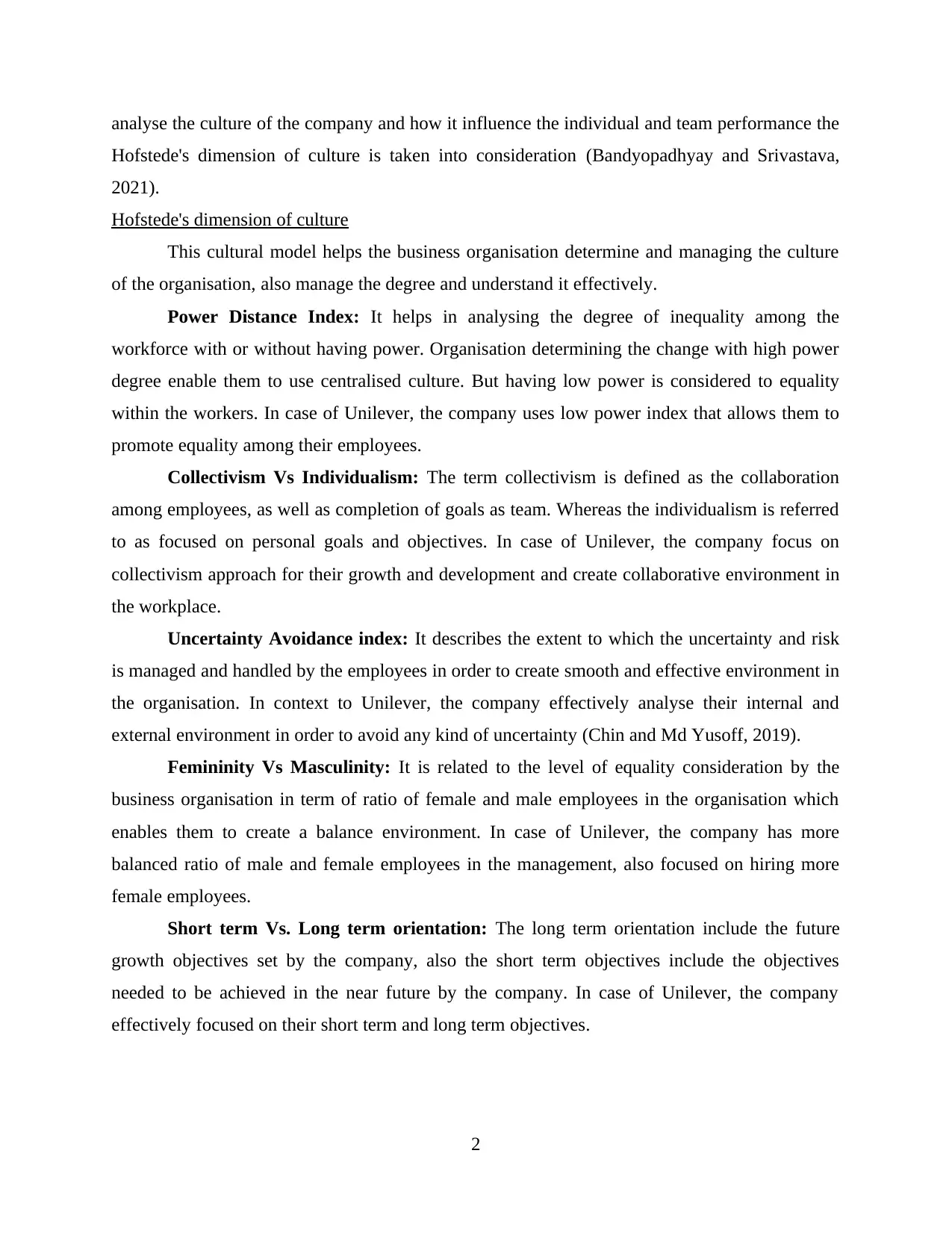
analyse the culture of the company and how it influence the individual and team performance the
Hofstede's dimension of culture is taken into consideration (Bandyopadhyay and Srivastava,
2021).
Hofstede's dimension of culture
This cultural model helps the business organisation determine and managing the culture
of the organisation, also manage the degree and understand it effectively.
Power Distance Index: It helps in analysing the degree of inequality among the
workforce with or without having power. Organisation determining the change with high power
degree enable them to use centralised culture. But having low power is considered to equality
within the workers. In case of Unilever, the company uses low power index that allows them to
promote equality among their employees.
Collectivism Vs Individualism: The term collectivism is defined as the collaboration
among employees, as well as completion of goals as team. Whereas the individualism is referred
to as focused on personal goals and objectives. In case of Unilever, the company focus on
collectivism approach for their growth and development and create collaborative environment in
the workplace.
Uncertainty Avoidance index: It describes the extent to which the uncertainty and risk
is managed and handled by the employees in order to create smooth and effective environment in
the organisation. In context to Unilever, the company effectively analyse their internal and
external environment in order to avoid any kind of uncertainty (Chin and Md Yusoff, 2019).
Femininity Vs Masculinity: It is related to the level of equality consideration by the
business organisation in term of ratio of female and male employees in the organisation which
enables them to create a balance environment. In case of Unilever, the company has more
balanced ratio of male and female employees in the management, also focused on hiring more
female employees.
Short term Vs. Long term orientation: The long term orientation include the future
growth objectives set by the company, also the short term objectives include the objectives
needed to be achieved in the near future by the company. In case of Unilever, the company
effectively focused on their short term and long term objectives.
2
Hofstede's dimension of culture is taken into consideration (Bandyopadhyay and Srivastava,
2021).
Hofstede's dimension of culture
This cultural model helps the business organisation determine and managing the culture
of the organisation, also manage the degree and understand it effectively.
Power Distance Index: It helps in analysing the degree of inequality among the
workforce with or without having power. Organisation determining the change with high power
degree enable them to use centralised culture. But having low power is considered to equality
within the workers. In case of Unilever, the company uses low power index that allows them to
promote equality among their employees.
Collectivism Vs Individualism: The term collectivism is defined as the collaboration
among employees, as well as completion of goals as team. Whereas the individualism is referred
to as focused on personal goals and objectives. In case of Unilever, the company focus on
collectivism approach for their growth and development and create collaborative environment in
the workplace.
Uncertainty Avoidance index: It describes the extent to which the uncertainty and risk
is managed and handled by the employees in order to create smooth and effective environment in
the organisation. In context to Unilever, the company effectively analyse their internal and
external environment in order to avoid any kind of uncertainty (Chin and Md Yusoff, 2019).
Femininity Vs Masculinity: It is related to the level of equality consideration by the
business organisation in term of ratio of female and male employees in the organisation which
enables them to create a balance environment. In case of Unilever, the company has more
balanced ratio of male and female employees in the management, also focused on hiring more
female employees.
Short term Vs. Long term orientation: The long term orientation include the future
growth objectives set by the company, also the short term objectives include the objectives
needed to be achieved in the near future by the company. In case of Unilever, the company
effectively focused on their short term and long term objectives.
2
Paraphrase This Document
Need a fresh take? Get an instant paraphrase of this document with our AI Paraphraser
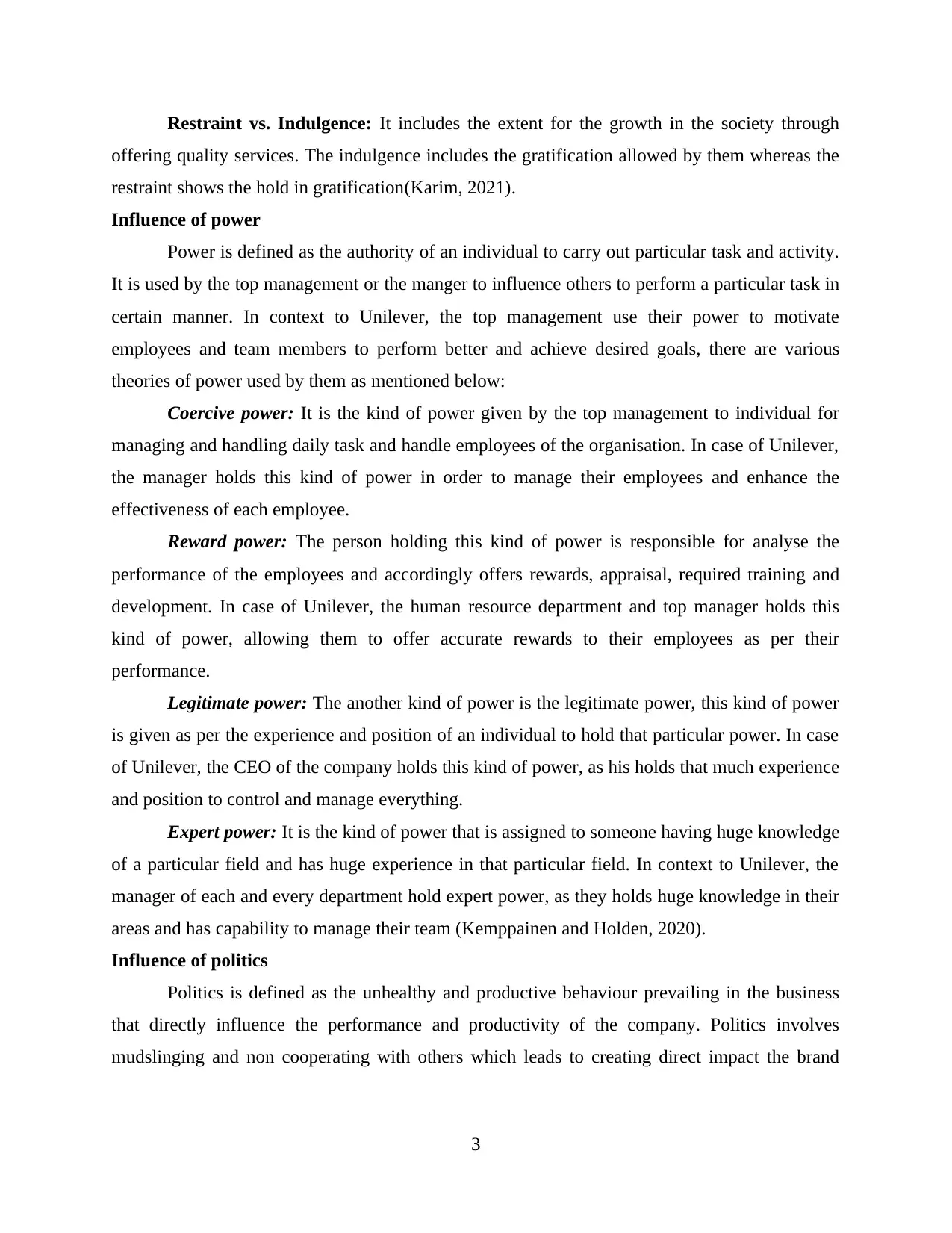
Restraint vs. Indulgence: It includes the extent for the growth in the society through
offering quality services. The indulgence includes the gratification allowed by them whereas the
restraint shows the hold in gratification(Karim, 2021).
Influence of power
Power is defined as the authority of an individual to carry out particular task and activity.
It is used by the top management or the manger to influence others to perform a particular task in
certain manner. In context to Unilever, the top management use their power to motivate
employees and team members to perform better and achieve desired goals, there are various
theories of power used by them as mentioned below:
Coercive power: It is the kind of power given by the top management to individual for
managing and handling daily task and handle employees of the organisation. In case of Unilever,
the manager holds this kind of power in order to manage their employees and enhance the
effectiveness of each employee.
Reward power: The person holding this kind of power is responsible for analyse the
performance of the employees and accordingly offers rewards, appraisal, required training and
development. In case of Unilever, the human resource department and top manager holds this
kind of power, allowing them to offer accurate rewards to their employees as per their
performance.
Legitimate power: The another kind of power is the legitimate power, this kind of power
is given as per the experience and position of an individual to hold that particular power. In case
of Unilever, the CEO of the company holds this kind of power, as his holds that much experience
and position to control and manage everything.
Expert power: It is the kind of power that is assigned to someone having huge knowledge
of a particular field and has huge experience in that particular field. In context to Unilever, the
manager of each and every department hold expert power, as they holds huge knowledge in their
areas and has capability to manage their team (Kemppainen and Holden, 2020).
Influence of politics
Politics is defined as the unhealthy and productive behaviour prevailing in the business
that directly influence the performance and productivity of the company. Politics involves
mudslinging and non cooperating with others which leads to creating direct impact the brand
3
offering quality services. The indulgence includes the gratification allowed by them whereas the
restraint shows the hold in gratification(Karim, 2021).
Influence of power
Power is defined as the authority of an individual to carry out particular task and activity.
It is used by the top management or the manger to influence others to perform a particular task in
certain manner. In context to Unilever, the top management use their power to motivate
employees and team members to perform better and achieve desired goals, there are various
theories of power used by them as mentioned below:
Coercive power: It is the kind of power given by the top management to individual for
managing and handling daily task and handle employees of the organisation. In case of Unilever,
the manager holds this kind of power in order to manage their employees and enhance the
effectiveness of each employee.
Reward power: The person holding this kind of power is responsible for analyse the
performance of the employees and accordingly offers rewards, appraisal, required training and
development. In case of Unilever, the human resource department and top manager holds this
kind of power, allowing them to offer accurate rewards to their employees as per their
performance.
Legitimate power: The another kind of power is the legitimate power, this kind of power
is given as per the experience and position of an individual to hold that particular power. In case
of Unilever, the CEO of the company holds this kind of power, as his holds that much experience
and position to control and manage everything.
Expert power: It is the kind of power that is assigned to someone having huge knowledge
of a particular field and has huge experience in that particular field. In context to Unilever, the
manager of each and every department hold expert power, as they holds huge knowledge in their
areas and has capability to manage their team (Kemppainen and Holden, 2020).
Influence of politics
Politics is defined as the unhealthy and productive behaviour prevailing in the business
that directly influence the performance and productivity of the company. Politics involves
mudslinging and non cooperating with others which leads to creating direct impact the brand
3
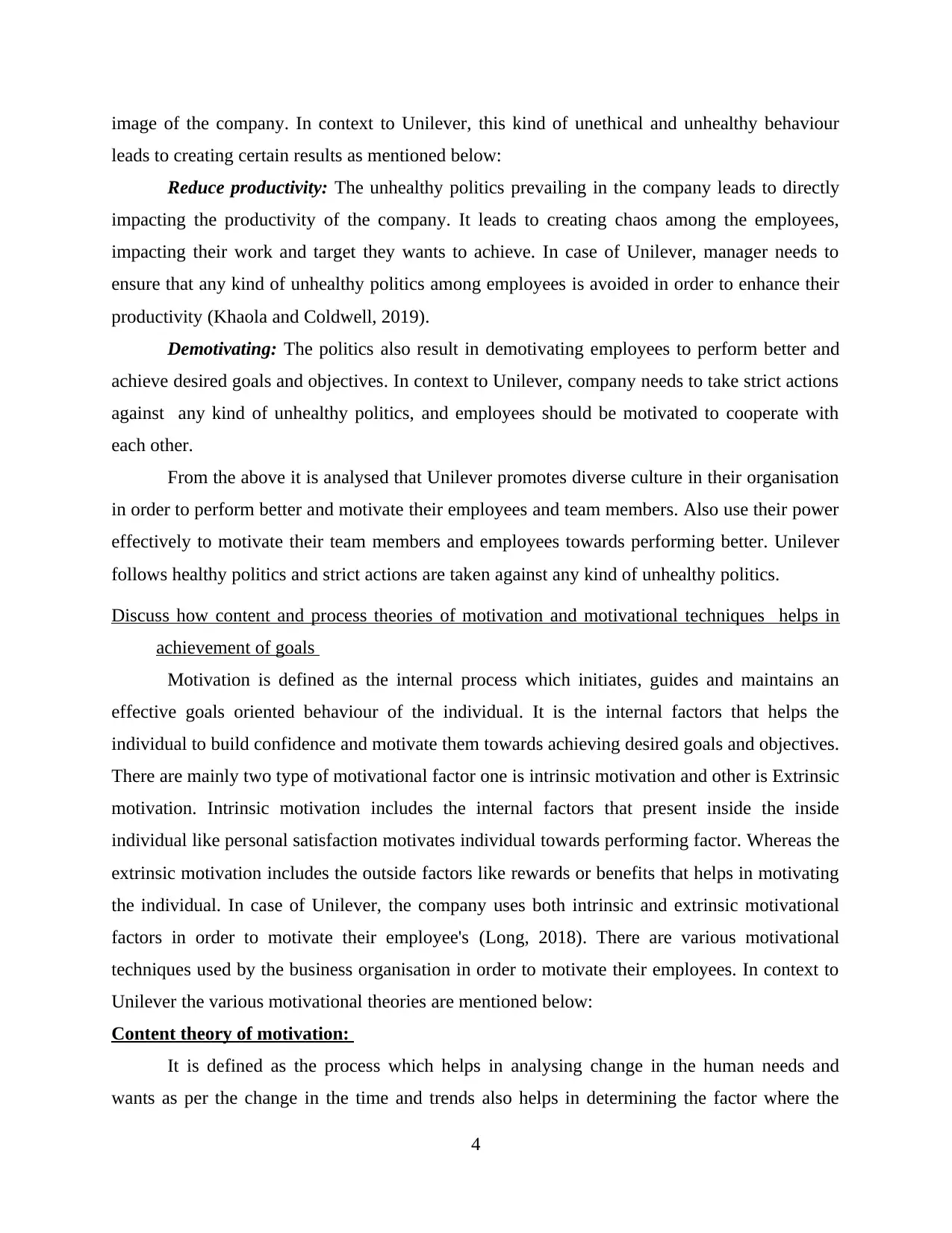
image of the company. In context to Unilever, this kind of unethical and unhealthy behaviour
leads to creating certain results as mentioned below:
Reduce productivity: The unhealthy politics prevailing in the company leads to directly
impacting the productivity of the company. It leads to creating chaos among the employees,
impacting their work and target they wants to achieve. In case of Unilever, manager needs to
ensure that any kind of unhealthy politics among employees is avoided in order to enhance their
productivity (Khaola and Coldwell, 2019).
Demotivating: The politics also result in demotivating employees to perform better and
achieve desired goals and objectives. In context to Unilever, company needs to take strict actions
against any kind of unhealthy politics, and employees should be motivated to cooperate with
each other.
From the above it is analysed that Unilever promotes diverse culture in their organisation
in order to perform better and motivate their employees and team members. Also use their power
effectively to motivate their team members and employees towards performing better. Unilever
follows healthy politics and strict actions are taken against any kind of unhealthy politics.
Discuss how content and process theories of motivation and motivational techniques helps in
achievement of goals
Motivation is defined as the internal process which initiates, guides and maintains an
effective goals oriented behaviour of the individual. It is the internal factors that helps the
individual to build confidence and motivate them towards achieving desired goals and objectives.
There are mainly two type of motivational factor one is intrinsic motivation and other is Extrinsic
motivation. Intrinsic motivation includes the internal factors that present inside the inside
individual like personal satisfaction motivates individual towards performing factor. Whereas the
extrinsic motivation includes the outside factors like rewards or benefits that helps in motivating
the individual. In case of Unilever, the company uses both intrinsic and extrinsic motivational
factors in order to motivate their employee's (Long, 2018). There are various motivational
techniques used by the business organisation in order to motivate their employees. In context to
Unilever the various motivational theories are mentioned below:
Content theory of motivation:
It is defined as the process which helps in analysing change in the human needs and
wants as per the change in the time and trends also helps in determining the factor where the
4
leads to creating certain results as mentioned below:
Reduce productivity: The unhealthy politics prevailing in the company leads to directly
impacting the productivity of the company. It leads to creating chaos among the employees,
impacting their work and target they wants to achieve. In case of Unilever, manager needs to
ensure that any kind of unhealthy politics among employees is avoided in order to enhance their
productivity (Khaola and Coldwell, 2019).
Demotivating: The politics also result in demotivating employees to perform better and
achieve desired goals and objectives. In context to Unilever, company needs to take strict actions
against any kind of unhealthy politics, and employees should be motivated to cooperate with
each other.
From the above it is analysed that Unilever promotes diverse culture in their organisation
in order to perform better and motivate their employees and team members. Also use their power
effectively to motivate their team members and employees towards performing better. Unilever
follows healthy politics and strict actions are taken against any kind of unhealthy politics.
Discuss how content and process theories of motivation and motivational techniques helps in
achievement of goals
Motivation is defined as the internal process which initiates, guides and maintains an
effective goals oriented behaviour of the individual. It is the internal factors that helps the
individual to build confidence and motivate them towards achieving desired goals and objectives.
There are mainly two type of motivational factor one is intrinsic motivation and other is Extrinsic
motivation. Intrinsic motivation includes the internal factors that present inside the inside
individual like personal satisfaction motivates individual towards performing factor. Whereas the
extrinsic motivation includes the outside factors like rewards or benefits that helps in motivating
the individual. In case of Unilever, the company uses both intrinsic and extrinsic motivational
factors in order to motivate their employee's (Long, 2018). There are various motivational
techniques used by the business organisation in order to motivate their employees. In context to
Unilever the various motivational theories are mentioned below:
Content theory of motivation:
It is defined as the process which helps in analysing change in the human needs and
wants as per the change in the time and trends also helps in determining the factor where the
4
⊘ This is a preview!⊘
Do you want full access?
Subscribe today to unlock all pages.

Trusted by 1+ million students worldwide
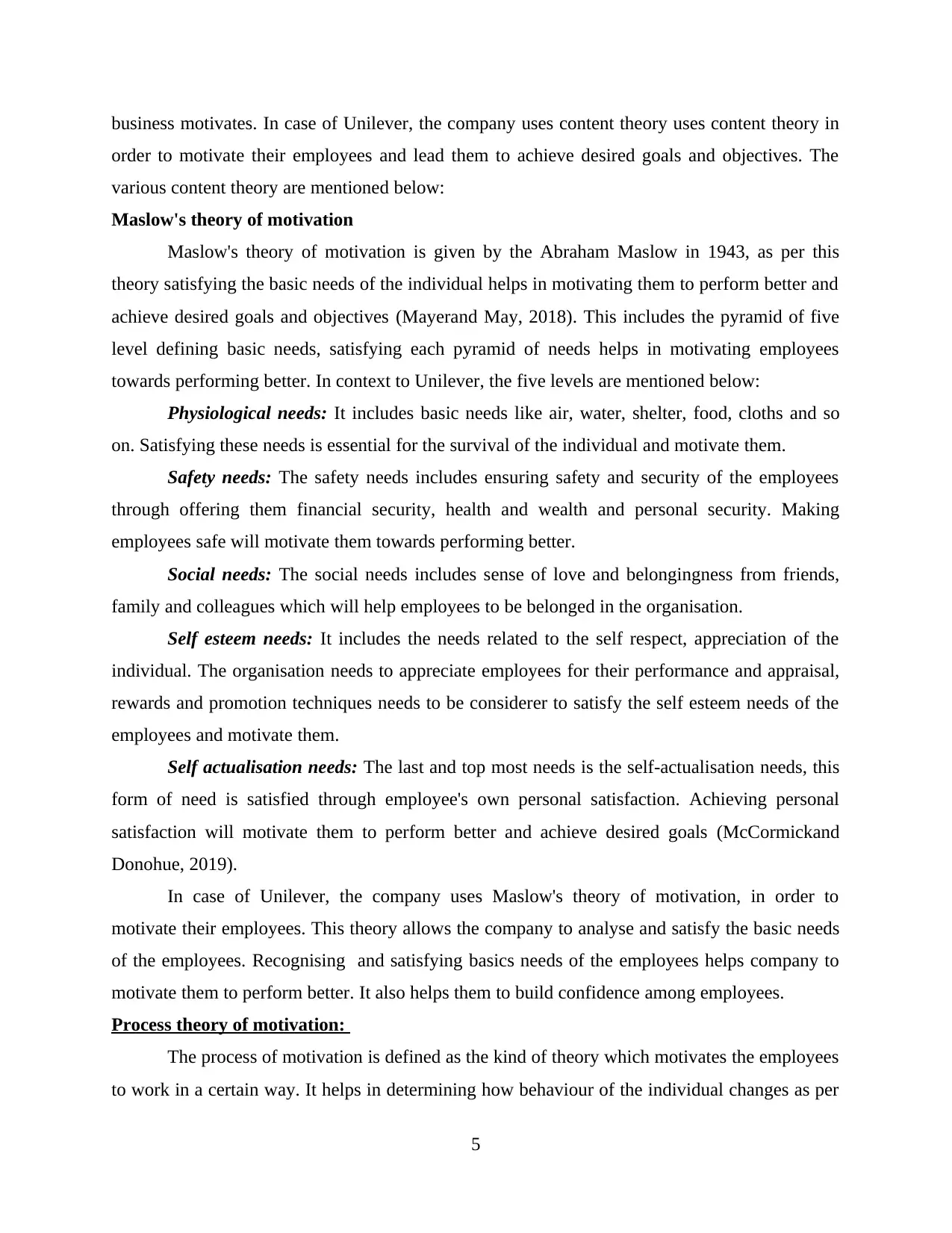
business motivates. In case of Unilever, the company uses content theory uses content theory in
order to motivate their employees and lead them to achieve desired goals and objectives. The
various content theory are mentioned below:
Maslow's theory of motivation
Maslow's theory of motivation is given by the Abraham Maslow in 1943, as per this
theory satisfying the basic needs of the individual helps in motivating them to perform better and
achieve desired goals and objectives (Mayerand May, 2018). This includes the pyramid of five
level defining basic needs, satisfying each pyramid of needs helps in motivating employees
towards performing better. In context to Unilever, the five levels are mentioned below:
Physiological needs: It includes basic needs like air, water, shelter, food, cloths and so
on. Satisfying these needs is essential for the survival of the individual and motivate them.
Safety needs: The safety needs includes ensuring safety and security of the employees
through offering them financial security, health and wealth and personal security. Making
employees safe will motivate them towards performing better.
Social needs: The social needs includes sense of love and belongingness from friends,
family and colleagues which will help employees to be belonged in the organisation.
Self esteem needs: It includes the needs related to the self respect, appreciation of the
individual. The organisation needs to appreciate employees for their performance and appraisal,
rewards and promotion techniques needs to be considerer to satisfy the self esteem needs of the
employees and motivate them.
Self actualisation needs: The last and top most needs is the self-actualisation needs, this
form of need is satisfied through employee's own personal satisfaction. Achieving personal
satisfaction will motivate them to perform better and achieve desired goals (McCormickand
Donohue, 2019).
In case of Unilever, the company uses Maslow's theory of motivation, in order to
motivate their employees. This theory allows the company to analyse and satisfy the basic needs
of the employees. Recognising and satisfying basics needs of the employees helps company to
motivate them to perform better. It also helps them to build confidence among employees.
Process theory of motivation:
The process of motivation is defined as the kind of theory which motivates the employees
to work in a certain way. It helps in determining how behaviour of the individual changes as per
5
order to motivate their employees and lead them to achieve desired goals and objectives. The
various content theory are mentioned below:
Maslow's theory of motivation
Maslow's theory of motivation is given by the Abraham Maslow in 1943, as per this
theory satisfying the basic needs of the individual helps in motivating them to perform better and
achieve desired goals and objectives (Mayerand May, 2018). This includes the pyramid of five
level defining basic needs, satisfying each pyramid of needs helps in motivating employees
towards performing better. In context to Unilever, the five levels are mentioned below:
Physiological needs: It includes basic needs like air, water, shelter, food, cloths and so
on. Satisfying these needs is essential for the survival of the individual and motivate them.
Safety needs: The safety needs includes ensuring safety and security of the employees
through offering them financial security, health and wealth and personal security. Making
employees safe will motivate them towards performing better.
Social needs: The social needs includes sense of love and belongingness from friends,
family and colleagues which will help employees to be belonged in the organisation.
Self esteem needs: It includes the needs related to the self respect, appreciation of the
individual. The organisation needs to appreciate employees for their performance and appraisal,
rewards and promotion techniques needs to be considerer to satisfy the self esteem needs of the
employees and motivate them.
Self actualisation needs: The last and top most needs is the self-actualisation needs, this
form of need is satisfied through employee's own personal satisfaction. Achieving personal
satisfaction will motivate them to perform better and achieve desired goals (McCormickand
Donohue, 2019).
In case of Unilever, the company uses Maslow's theory of motivation, in order to
motivate their employees. This theory allows the company to analyse and satisfy the basic needs
of the employees. Recognising and satisfying basics needs of the employees helps company to
motivate them to perform better. It also helps them to build confidence among employees.
Process theory of motivation:
The process of motivation is defined as the kind of theory which motivates the employees
to work in a certain way. It helps in determining how behaviour of the individual changes as per
5
Paraphrase This Document
Need a fresh take? Get an instant paraphrase of this document with our AI Paraphraser
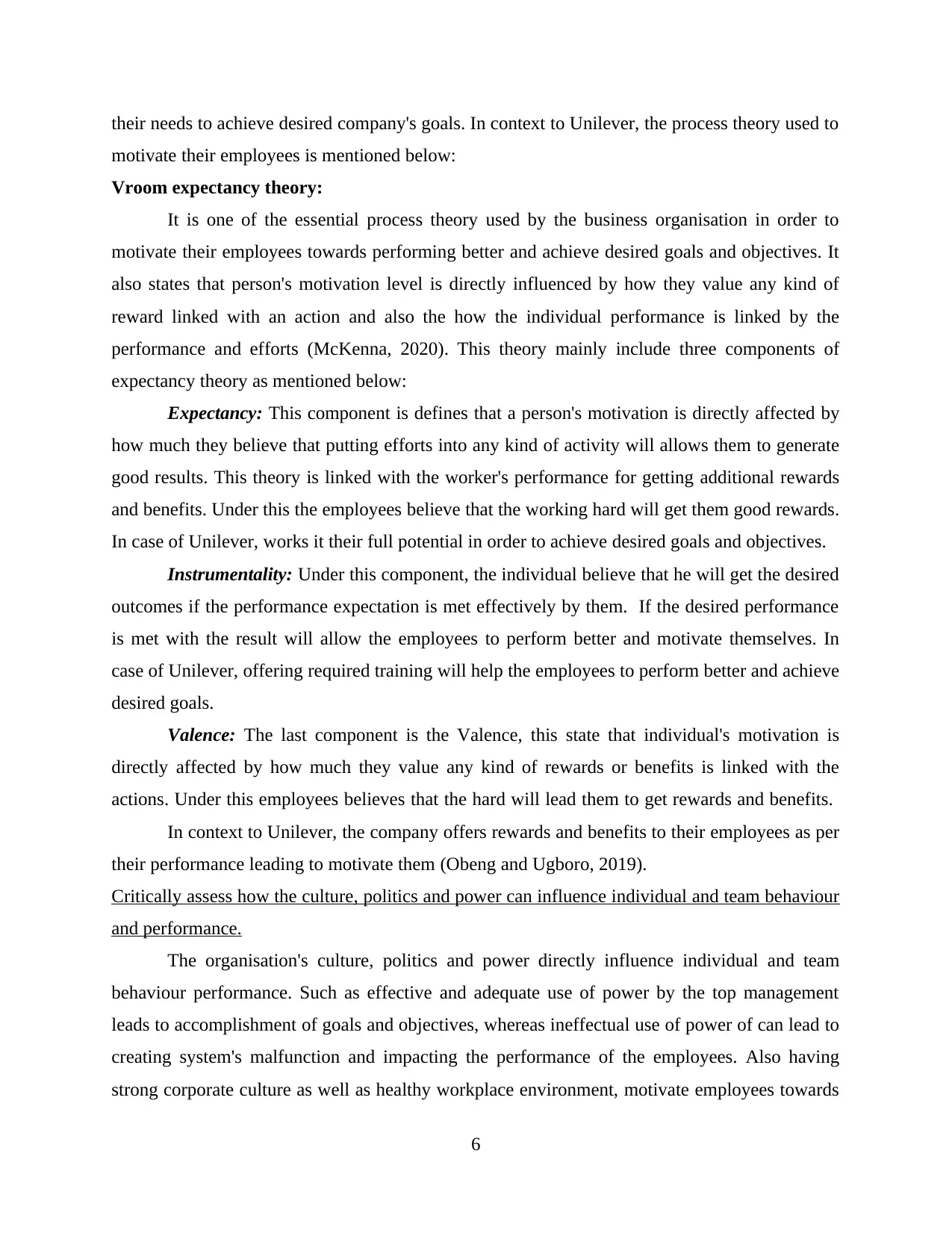
their needs to achieve desired company's goals. In context to Unilever, the process theory used to
motivate their employees is mentioned below:
Vroom expectancy theory:
It is one of the essential process theory used by the business organisation in order to
motivate their employees towards performing better and achieve desired goals and objectives. It
also states that person's motivation level is directly influenced by how they value any kind of
reward linked with an action and also the how the individual performance is linked by the
performance and efforts (McKenna, 2020). This theory mainly include three components of
expectancy theory as mentioned below:
Expectancy: This component is defines that a person's motivation is directly affected by
how much they believe that putting efforts into any kind of activity will allows them to generate
good results. This theory is linked with the worker's performance for getting additional rewards
and benefits. Under this the employees believe that the working hard will get them good rewards.
In case of Unilever, works it their full potential in order to achieve desired goals and objectives.
Instrumentality: Under this component, the individual believe that he will get the desired
outcomes if the performance expectation is met effectively by them. If the desired performance
is met with the result will allow the employees to perform better and motivate themselves. In
case of Unilever, offering required training will help the employees to perform better and achieve
desired goals.
Valence: The last component is the Valence, this state that individual's motivation is
directly affected by how much they value any kind of rewards or benefits is linked with the
actions. Under this employees believes that the hard will lead them to get rewards and benefits.
In context to Unilever, the company offers rewards and benefits to their employees as per
their performance leading to motivate them (Obeng and Ugboro, 2019).
Critically assess how the culture, politics and power can influence individual and team behaviour
and performance.
The organisation's culture, politics and power directly influence individual and team
behaviour performance. Such as effective and adequate use of power by the top management
leads to accomplishment of goals and objectives, whereas ineffectual use of power of can lead to
creating system's malfunction and impacting the performance of the employees. Also having
strong corporate culture as well as healthy workplace environment, motivate employees towards
6
motivate their employees is mentioned below:
Vroom expectancy theory:
It is one of the essential process theory used by the business organisation in order to
motivate their employees towards performing better and achieve desired goals and objectives. It
also states that person's motivation level is directly influenced by how they value any kind of
reward linked with an action and also the how the individual performance is linked by the
performance and efforts (McKenna, 2020). This theory mainly include three components of
expectancy theory as mentioned below:
Expectancy: This component is defines that a person's motivation is directly affected by
how much they believe that putting efforts into any kind of activity will allows them to generate
good results. This theory is linked with the worker's performance for getting additional rewards
and benefits. Under this the employees believe that the working hard will get them good rewards.
In case of Unilever, works it their full potential in order to achieve desired goals and objectives.
Instrumentality: Under this component, the individual believe that he will get the desired
outcomes if the performance expectation is met effectively by them. If the desired performance
is met with the result will allow the employees to perform better and motivate themselves. In
case of Unilever, offering required training will help the employees to perform better and achieve
desired goals.
Valence: The last component is the Valence, this state that individual's motivation is
directly affected by how much they value any kind of rewards or benefits is linked with the
actions. Under this employees believes that the hard will lead them to get rewards and benefits.
In context to Unilever, the company offers rewards and benefits to their employees as per
their performance leading to motivate them (Obeng and Ugboro, 2019).
Critically assess how the culture, politics and power can influence individual and team behaviour
and performance.
The organisation's culture, politics and power directly influence individual and team
behaviour performance. Such as effective and adequate use of power by the top management
leads to accomplishment of goals and objectives, whereas ineffectual use of power of can lead to
creating system's malfunction and impacting the performance of the employees. Also having
strong corporate culture as well as healthy workplace environment, motivate employees towards
6
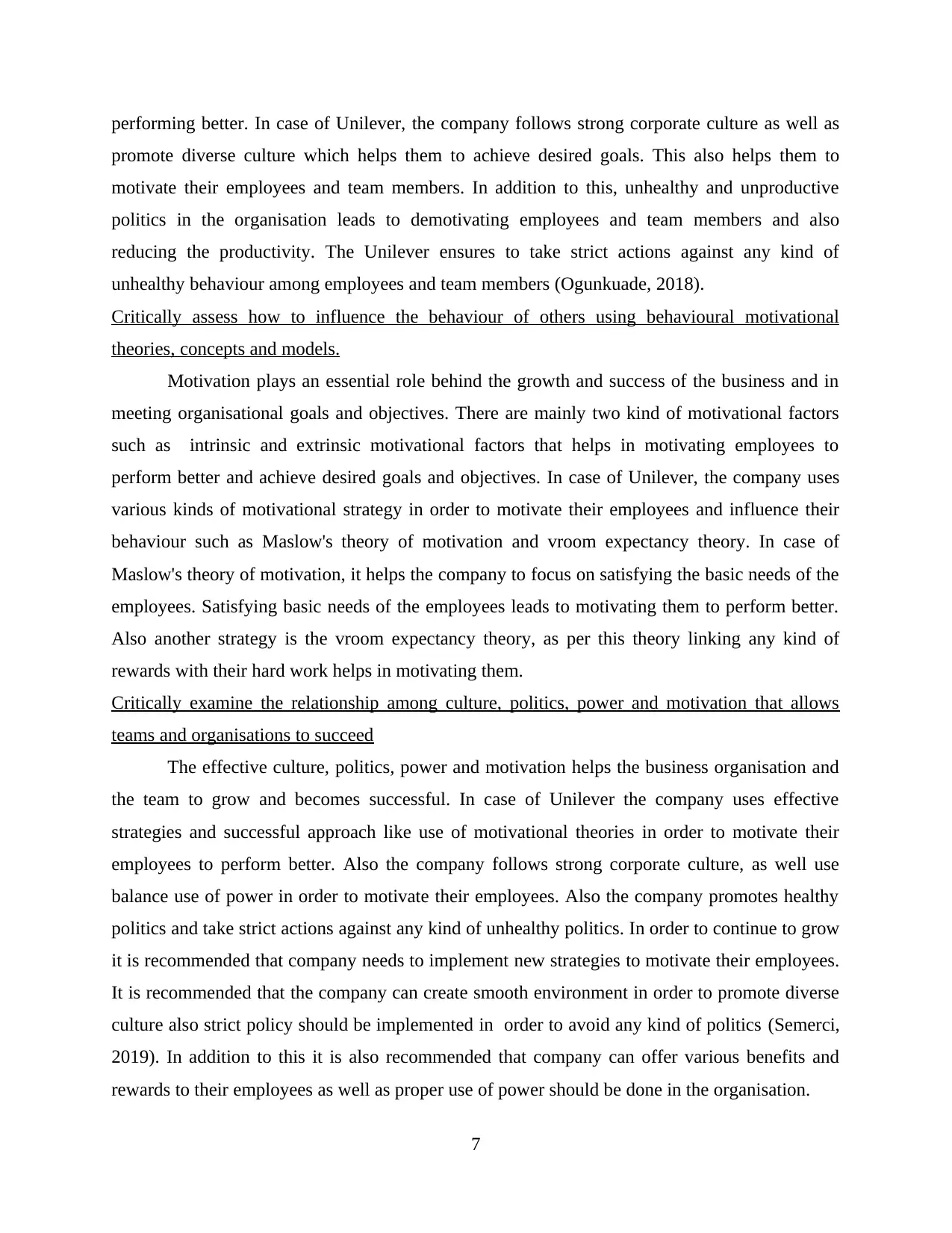
performing better. In case of Unilever, the company follows strong corporate culture as well as
promote diverse culture which helps them to achieve desired goals. This also helps them to
motivate their employees and team members. In addition to this, unhealthy and unproductive
politics in the organisation leads to demotivating employees and team members and also
reducing the productivity. The Unilever ensures to take strict actions against any kind of
unhealthy behaviour among employees and team members (Ogunkuade, 2018).
Critically assess how to influence the behaviour of others using behavioural motivational
theories, concepts and models.
Motivation plays an essential role behind the growth and success of the business and in
meeting organisational goals and objectives. There are mainly two kind of motivational factors
such as intrinsic and extrinsic motivational factors that helps in motivating employees to
perform better and achieve desired goals and objectives. In case of Unilever, the company uses
various kinds of motivational strategy in order to motivate their employees and influence their
behaviour such as Maslow's theory of motivation and vroom expectancy theory. In case of
Maslow's theory of motivation, it helps the company to focus on satisfying the basic needs of the
employees. Satisfying basic needs of the employees leads to motivating them to perform better.
Also another strategy is the vroom expectancy theory, as per this theory linking any kind of
rewards with their hard work helps in motivating them.
Critically examine the relationship among culture, politics, power and motivation that allows
teams and organisations to succeed
The effective culture, politics, power and motivation helps the business organisation and
the team to grow and becomes successful. In case of Unilever the company uses effective
strategies and successful approach like use of motivational theories in order to motivate their
employees to perform better. Also the company follows strong corporate culture, as well use
balance use of power in order to motivate their employees. Also the company promotes healthy
politics and take strict actions against any kind of unhealthy politics. In order to continue to grow
it is recommended that company needs to implement new strategies to motivate their employees.
It is recommended that the company can create smooth environment in order to promote diverse
culture also strict policy should be implemented in order to avoid any kind of politics (Semerci,
2019). In addition to this it is also recommended that company can offer various benefits and
rewards to their employees as well as proper use of power should be done in the organisation.
7
promote diverse culture which helps them to achieve desired goals. This also helps them to
motivate their employees and team members. In addition to this, unhealthy and unproductive
politics in the organisation leads to demotivating employees and team members and also
reducing the productivity. The Unilever ensures to take strict actions against any kind of
unhealthy behaviour among employees and team members (Ogunkuade, 2018).
Critically assess how to influence the behaviour of others using behavioural motivational
theories, concepts and models.
Motivation plays an essential role behind the growth and success of the business and in
meeting organisational goals and objectives. There are mainly two kind of motivational factors
such as intrinsic and extrinsic motivational factors that helps in motivating employees to
perform better and achieve desired goals and objectives. In case of Unilever, the company uses
various kinds of motivational strategy in order to motivate their employees and influence their
behaviour such as Maslow's theory of motivation and vroom expectancy theory. In case of
Maslow's theory of motivation, it helps the company to focus on satisfying the basic needs of the
employees. Satisfying basic needs of the employees leads to motivating them to perform better.
Also another strategy is the vroom expectancy theory, as per this theory linking any kind of
rewards with their hard work helps in motivating them.
Critically examine the relationship among culture, politics, power and motivation that allows
teams and organisations to succeed
The effective culture, politics, power and motivation helps the business organisation and
the team to grow and becomes successful. In case of Unilever the company uses effective
strategies and successful approach like use of motivational theories in order to motivate their
employees to perform better. Also the company follows strong corporate culture, as well use
balance use of power in order to motivate their employees. Also the company promotes healthy
politics and take strict actions against any kind of unhealthy politics. In order to continue to grow
it is recommended that company needs to implement new strategies to motivate their employees.
It is recommended that the company can create smooth environment in order to promote diverse
culture also strict policy should be implemented in order to avoid any kind of politics (Semerci,
2019). In addition to this it is also recommended that company can offer various benefits and
rewards to their employees as well as proper use of power should be done in the organisation.
7
⊘ This is a preview!⊘
Do you want full access?
Subscribe today to unlock all pages.

Trusted by 1+ million students worldwide
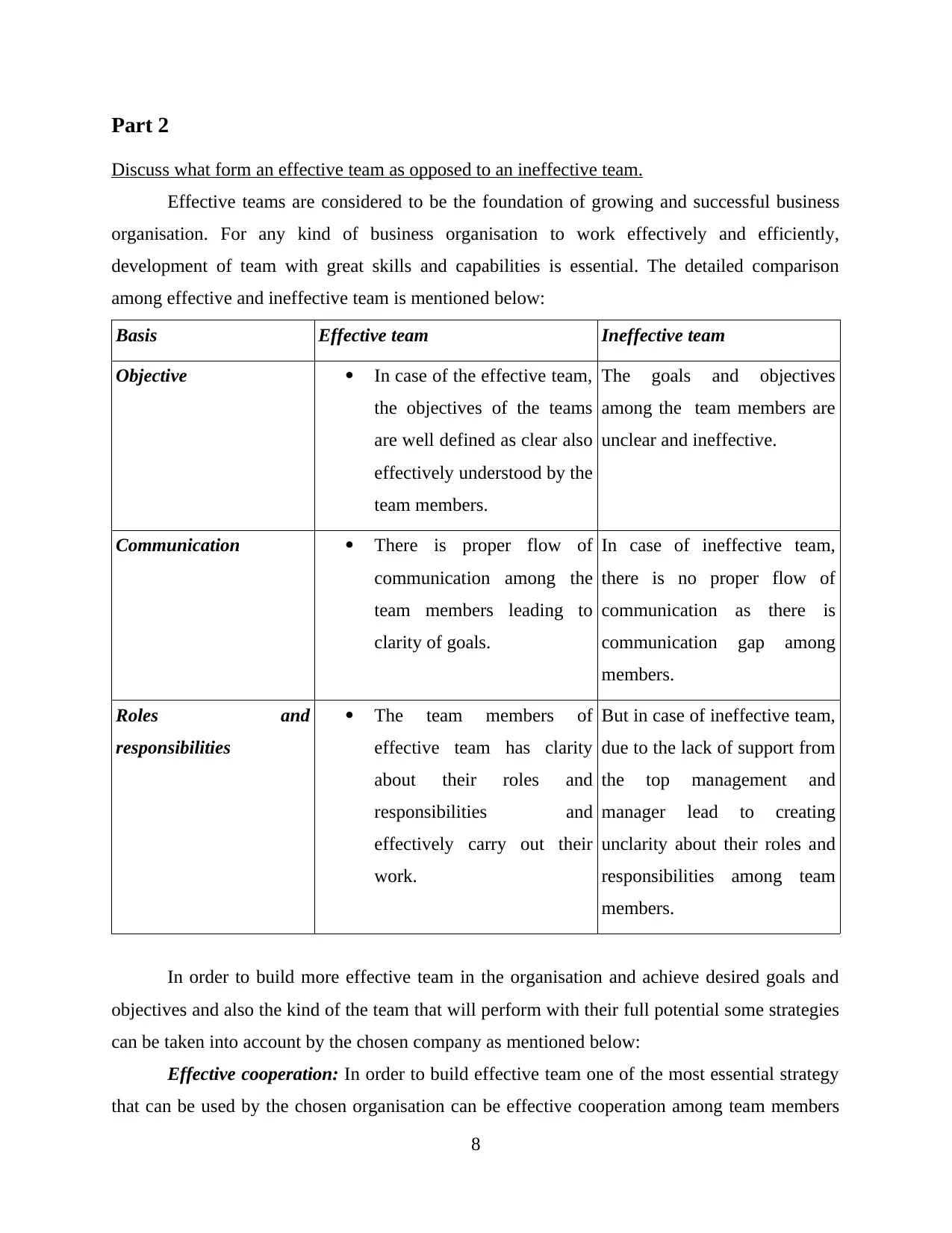
Part 2
Discuss what form an effective team as opposed to an ineffective team.
Effective teams are considered to be the foundation of growing and successful business
organisation. For any kind of business organisation to work effectively and efficiently,
development of team with great skills and capabilities is essential. The detailed comparison
among effective and ineffective team is mentioned below:
Basis Effective team Ineffective team
Objective In case of the effective team,
the objectives of the teams
are well defined as clear also
effectively understood by the
team members.
The goals and objectives
among the team members are
unclear and ineffective.
Communication There is proper flow of
communication among the
team members leading to
clarity of goals.
In case of ineffective team,
there is no proper flow of
communication as there is
communication gap among
members.
Roles and
responsibilities
The team members of
effective team has clarity
about their roles and
responsibilities and
effectively carry out their
work.
But in case of ineffective team,
due to the lack of support from
the top management and
manager lead to creating
unclarity about their roles and
responsibilities among team
members.
In order to build more effective team in the organisation and achieve desired goals and
objectives and also the kind of the team that will perform with their full potential some strategies
can be taken into account by the chosen company as mentioned below:
Effective cooperation: In order to build effective team one of the most essential strategy
that can be used by the chosen organisation can be effective cooperation among team members
8
Discuss what form an effective team as opposed to an ineffective team.
Effective teams are considered to be the foundation of growing and successful business
organisation. For any kind of business organisation to work effectively and efficiently,
development of team with great skills and capabilities is essential. The detailed comparison
among effective and ineffective team is mentioned below:
Basis Effective team Ineffective team
Objective In case of the effective team,
the objectives of the teams
are well defined as clear also
effectively understood by the
team members.
The goals and objectives
among the team members are
unclear and ineffective.
Communication There is proper flow of
communication among the
team members leading to
clarity of goals.
In case of ineffective team,
there is no proper flow of
communication as there is
communication gap among
members.
Roles and
responsibilities
The team members of
effective team has clarity
about their roles and
responsibilities and
effectively carry out their
work.
But in case of ineffective team,
due to the lack of support from
the top management and
manager lead to creating
unclarity about their roles and
responsibilities among team
members.
In order to build more effective team in the organisation and achieve desired goals and
objectives and also the kind of the team that will perform with their full potential some strategies
can be taken into account by the chosen company as mentioned below:
Effective cooperation: In order to build effective team one of the most essential strategy
that can be used by the chosen organisation can be effective cooperation among team members
8
Paraphrase This Document
Need a fresh take? Get an instant paraphrase of this document with our AI Paraphraser
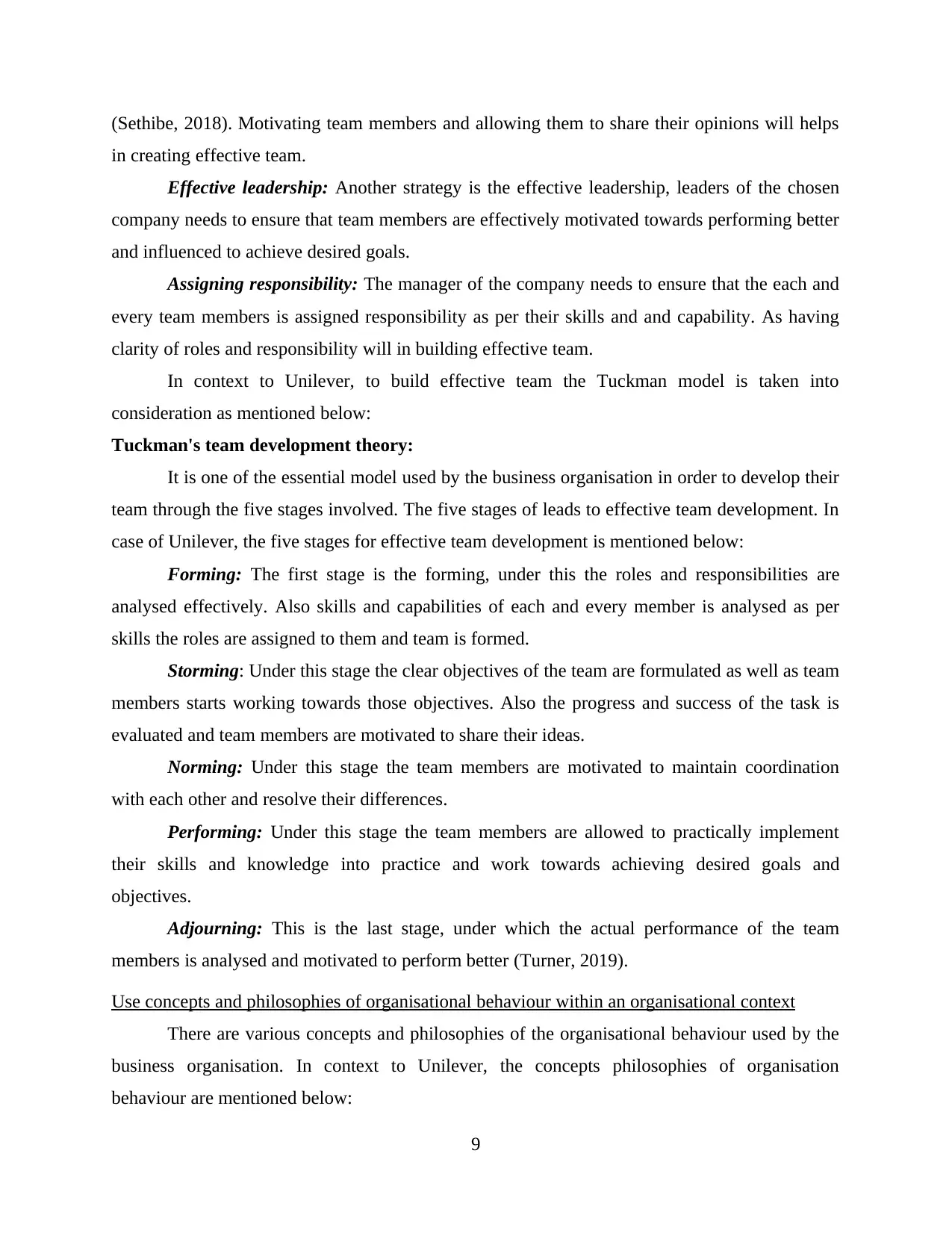
(Sethibe, 2018). Motivating team members and allowing them to share their opinions will helps
in creating effective team.
Effective leadership: Another strategy is the effective leadership, leaders of the chosen
company needs to ensure that team members are effectively motivated towards performing better
and influenced to achieve desired goals.
Assigning responsibility: The manager of the company needs to ensure that the each and
every team members is assigned responsibility as per their skills and and capability. As having
clarity of roles and responsibility will in building effective team.
In context to Unilever, to build effective team the Tuckman model is taken into
consideration as mentioned below:
Tuckman's team development theory:
It is one of the essential model used by the business organisation in order to develop their
team through the five stages involved. The five stages of leads to effective team development. In
case of Unilever, the five stages for effective team development is mentioned below:
Forming: The first stage is the forming, under this the roles and responsibilities are
analysed effectively. Also skills and capabilities of each and every member is analysed as per
skills the roles are assigned to them and team is formed.
Storming: Under this stage the clear objectives of the team are formulated as well as team
members starts working towards those objectives. Also the progress and success of the task is
evaluated and team members are motivated to share their ideas.
Norming: Under this stage the team members are motivated to maintain coordination
with each other and resolve their differences.
Performing: Under this stage the team members are allowed to practically implement
their skills and knowledge into practice and work towards achieving desired goals and
objectives.
Adjourning: This is the last stage, under which the actual performance of the team
members is analysed and motivated to perform better (Turner, 2019).
Use concepts and philosophies of organisational behaviour within an organisational context
There are various concepts and philosophies of the organisational behaviour used by the
business organisation. In context to Unilever, the concepts philosophies of organisation
behaviour are mentioned below:
9
in creating effective team.
Effective leadership: Another strategy is the effective leadership, leaders of the chosen
company needs to ensure that team members are effectively motivated towards performing better
and influenced to achieve desired goals.
Assigning responsibility: The manager of the company needs to ensure that the each and
every team members is assigned responsibility as per their skills and and capability. As having
clarity of roles and responsibility will in building effective team.
In context to Unilever, to build effective team the Tuckman model is taken into
consideration as mentioned below:
Tuckman's team development theory:
It is one of the essential model used by the business organisation in order to develop their
team through the five stages involved. The five stages of leads to effective team development. In
case of Unilever, the five stages for effective team development is mentioned below:
Forming: The first stage is the forming, under this the roles and responsibilities are
analysed effectively. Also skills and capabilities of each and every member is analysed as per
skills the roles are assigned to them and team is formed.
Storming: Under this stage the clear objectives of the team are formulated as well as team
members starts working towards those objectives. Also the progress and success of the task is
evaluated and team members are motivated to share their ideas.
Norming: Under this stage the team members are motivated to maintain coordination
with each other and resolve their differences.
Performing: Under this stage the team members are allowed to practically implement
their skills and knowledge into practice and work towards achieving desired goals and
objectives.
Adjourning: This is the last stage, under which the actual performance of the team
members is analysed and motivated to perform better (Turner, 2019).
Use concepts and philosophies of organisational behaviour within an organisational context
There are various concepts and philosophies of the organisational behaviour used by the
business organisation. In context to Unilever, the concepts philosophies of organisation
behaviour are mentioned below:
9
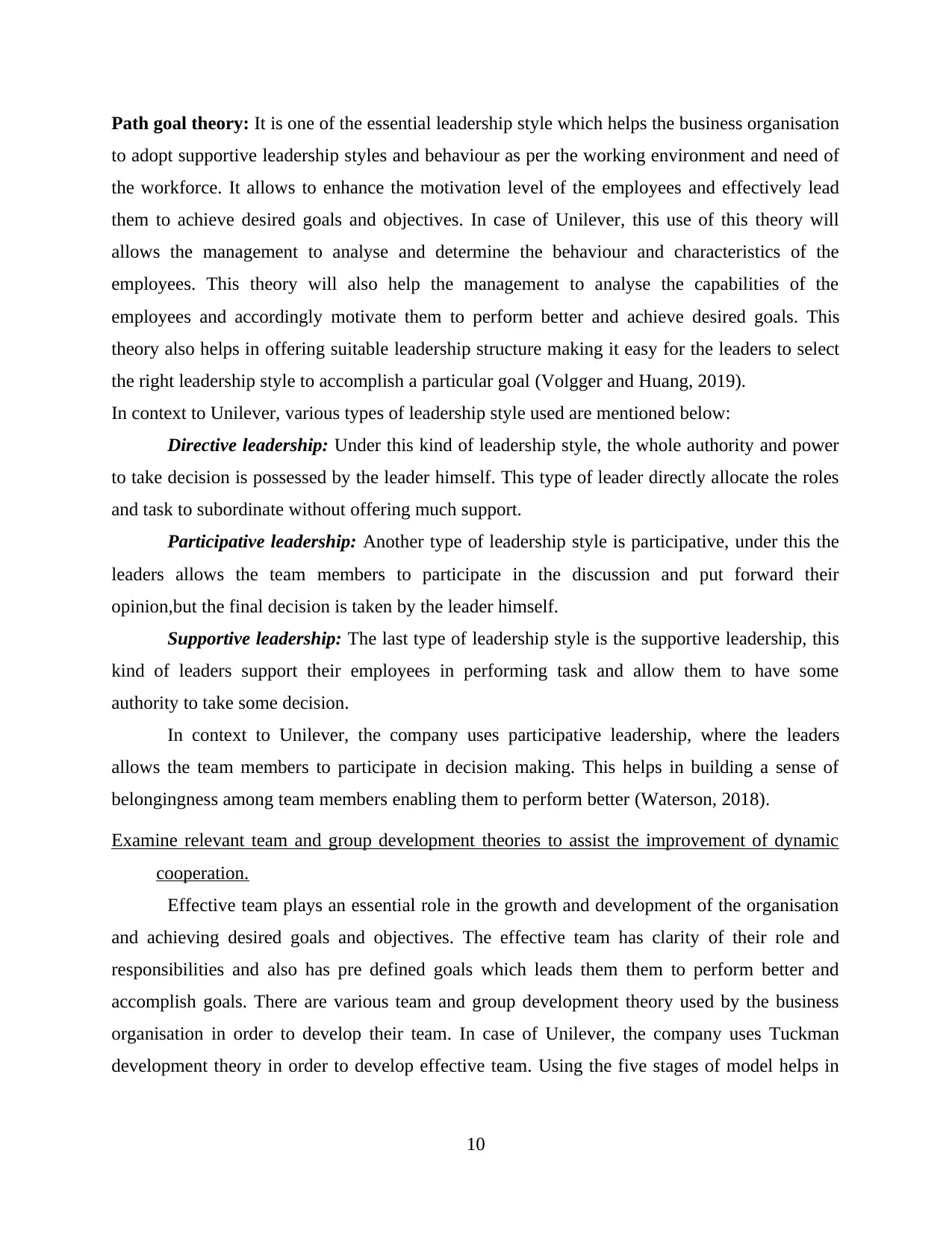
Path goal theory: It is one of the essential leadership style which helps the business organisation
to adopt supportive leadership styles and behaviour as per the working environment and need of
the workforce. It allows to enhance the motivation level of the employees and effectively lead
them to achieve desired goals and objectives. In case of Unilever, this use of this theory will
allows the management to analyse and determine the behaviour and characteristics of the
employees. This theory will also help the management to analyse the capabilities of the
employees and accordingly motivate them to perform better and achieve desired goals. This
theory also helps in offering suitable leadership structure making it easy for the leaders to select
the right leadership style to accomplish a particular goal (Volgger and Huang, 2019).
In context to Unilever, various types of leadership style used are mentioned below:
Directive leadership: Under this kind of leadership style, the whole authority and power
to take decision is possessed by the leader himself. This type of leader directly allocate the roles
and task to subordinate without offering much support.
Participative leadership: Another type of leadership style is participative, under this the
leaders allows the team members to participate in the discussion and put forward their
opinion,but the final decision is taken by the leader himself.
Supportive leadership: The last type of leadership style is the supportive leadership, this
kind of leaders support their employees in performing task and allow them to have some
authority to take some decision.
In context to Unilever, the company uses participative leadership, where the leaders
allows the team members to participate in decision making. This helps in building a sense of
belongingness among team members enabling them to perform better (Waterson, 2018).
Examine relevant team and group development theories to assist the improvement of dynamic
cooperation.
Effective team plays an essential role in the growth and development of the organisation
and achieving desired goals and objectives. The effective team has clarity of their role and
responsibilities and also has pre defined goals which leads them them to perform better and
accomplish goals. There are various team and group development theory used by the business
organisation in order to develop their team. In case of Unilever, the company uses Tuckman
development theory in order to develop effective team. Using the five stages of model helps in
10
to adopt supportive leadership styles and behaviour as per the working environment and need of
the workforce. It allows to enhance the motivation level of the employees and effectively lead
them to achieve desired goals and objectives. In case of Unilever, this use of this theory will
allows the management to analyse and determine the behaviour and characteristics of the
employees. This theory will also help the management to analyse the capabilities of the
employees and accordingly motivate them to perform better and achieve desired goals. This
theory also helps in offering suitable leadership structure making it easy for the leaders to select
the right leadership style to accomplish a particular goal (Volgger and Huang, 2019).
In context to Unilever, various types of leadership style used are mentioned below:
Directive leadership: Under this kind of leadership style, the whole authority and power
to take decision is possessed by the leader himself. This type of leader directly allocate the roles
and task to subordinate without offering much support.
Participative leadership: Another type of leadership style is participative, under this the
leaders allows the team members to participate in the discussion and put forward their
opinion,but the final decision is taken by the leader himself.
Supportive leadership: The last type of leadership style is the supportive leadership, this
kind of leaders support their employees in performing task and allow them to have some
authority to take some decision.
In context to Unilever, the company uses participative leadership, where the leaders
allows the team members to participate in decision making. This helps in building a sense of
belongingness among team members enabling them to perform better (Waterson, 2018).
Examine relevant team and group development theories to assist the improvement of dynamic
cooperation.
Effective team plays an essential role in the growth and development of the organisation
and achieving desired goals and objectives. The effective team has clarity of their role and
responsibilities and also has pre defined goals which leads them them to perform better and
accomplish goals. There are various team and group development theory used by the business
organisation in order to develop their team. In case of Unilever, the company uses Tuckman
development theory in order to develop effective team. Using the five stages of model helps in
10
⊘ This is a preview!⊘
Do you want full access?
Subscribe today to unlock all pages.

Trusted by 1+ million students worldwide
1 out of 16
Related Documents
Your All-in-One AI-Powered Toolkit for Academic Success.
+13062052269
info@desklib.com
Available 24*7 on WhatsApp / Email
![[object Object]](/_next/static/media/star-bottom.7253800d.svg)
Unlock your academic potential
Copyright © 2020–2026 A2Z Services. All Rights Reserved. Developed and managed by ZUCOL.




